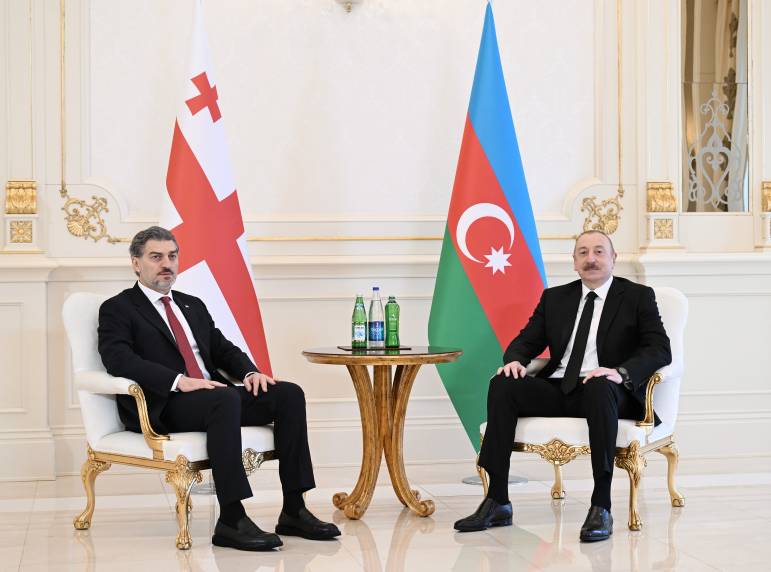20:15
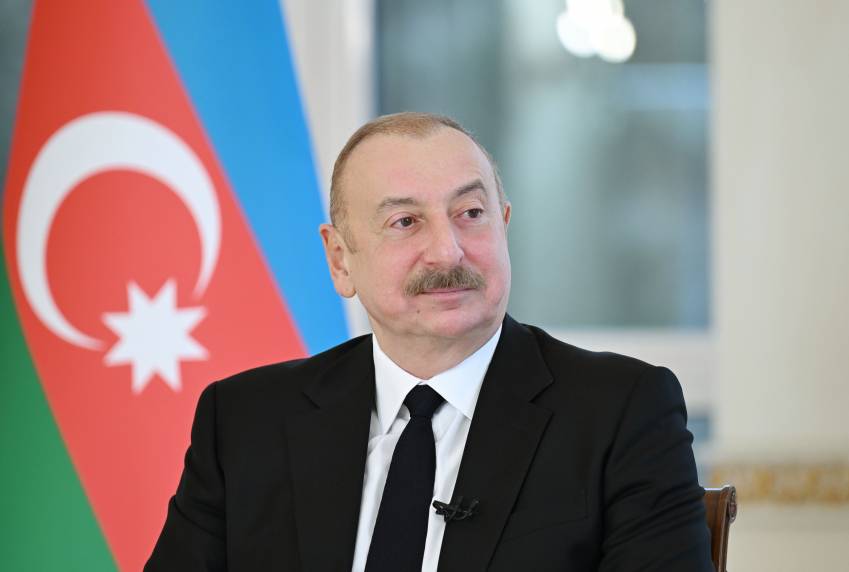
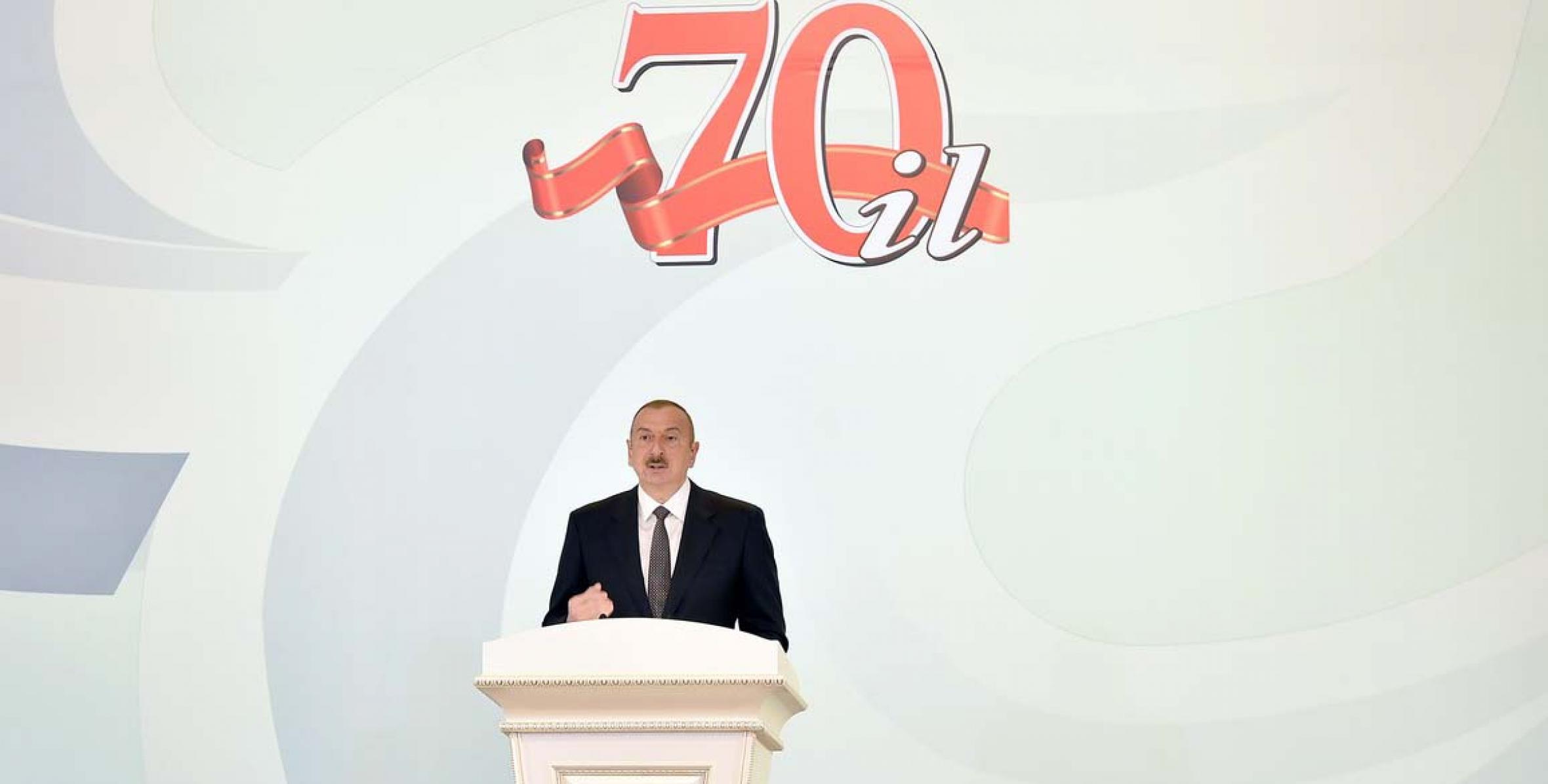
Dear people of Sumgayit, dear friends!
I sincerely congratulate you and all the people of Sumgayit, as well as the entire Azerbaijani people, on the 70th anniversary of Sumgayit, and wish you continued success and new victories.
Sumgayit today is a modern, rapidly developing, beautiful city improving every day and possessing great industrial potential. I congratulate the people of Sumgayit on all the successes achieved.
Sumgayit has an ancient history but as a city Sumgayit was established 70 years ago. By a decree of the Council of Ministers, the city of Sumgayit was established on 22 November 1949 and its dynamic development began. Sumgayit formed as an industrial city, developed as a city of chemists. Numerous industrial enterprises and jobs were created in Sumgayit. Personnel began to flow into Sumgayit from various regions of Azerbaijan. At the same time, people from other republics of the Soviet Union were provided with jobs in Sumgayit.
Unfortunately, during the first stage of the city’s establishment, attention was not paid to the environmental balance in Sumgayit, this balance was disrupted. In those years, Sumgayit was the most environmentally unclean city of the Soviet Union. Of course, this harmed people's health and disrupted the environmental balance. Only after great leader Heydar Aliyev was elected leader of Azerbaijan in 1969, attention started to be paid to the environmental situation. I know that Heydar Aliyev repeatedly appealed to central authorities to improve the environmental situation in Sumgayit. Appropriate measures were taken, treatment plants were built and the environmental situation in the city improved in the 1970s, but still did not fully meet the standards. However, today we see that Sumgayit is an ecologically clean city, there is clean air and beautiful nature here. I am sure that the steps to be taken in this direction will make Sumgayit even more beautiful.
During Heydar Aliyev’s leadership, Sumgayit developed as a modern industrial city. New residential buildings were built, social facilities were set up, parks and alleys were established, trees were planted, and Sumgayit developed in the Soviet Union as an important industrial city of all-Union significance. After great leader Heydar Aliyev left for Moscow in 1982, a period of recession began in Sumgayit, as was the case elsewhere in Azerbaijan. The then leaders of the republic did not fully realize their responsibility, did not exercise control over the processes, and as a result of this, it is possible to say that there was no development in Azerbaijan, a period of stagnation set in. As a member of the Politburo and first deputy chairman of the Council of Ministers of the Soviet Union, Heydar Aliyev always provided assistance and paid attention to Azerbaijan. Despite this, there was a recession in the republic, especially starting from 1985, after the period of "perestroika" began in the Soviet Union. Very negative processes began to unfold in the Soviet Union, including Azerbaijan. It is no coincidence that six years after the start of the policy of "perestroika", such a gigantic state as the Soviet Union fell apart.
In 1985, Azerbaijan was faced with great difficulties because stagnation reigned in the economic sphere. At the same time, Armenian nationalists raised their heads both in Nagorno-Karabakh and in other places of our republic, including Sumgayit. Under great leader Heydar Aliyev, the percentage of the Azerbaijani population in Nagorno-Karabakh increased sharply, it doubled to reach 30 percent. If Heydar Aliyev had not left for Moscow in 1982 and stayed in Azerbaijan, then the Azerbaijani population could have reached 50 percent within 10 years. Armenian nationalists in Nagorno-Karabakh raised the issue of separating Nagorno-Karabakh from Azerbaijan and annexing it to Armenia. Unfortunately, the leadership of the Azerbaijan Republic remained indifferent to this issue, did not realize its responsibility and thus lost control over the situation. At the same time, Armenian nationalists managed to build a nest in Sumgayit, and an impetus was given to negative processes here too. I have to say that there were several reasons for the collapse of the Soviet Union. The main reason was that economic relations were built incorrectly. The planned economy did not justify itself. In the 1980s, the development of the Soviet Union was based more on the oil factor, and after a sharp drop in the oil price on world markets, revenues declined, and it was not possible to generate these revenues from other sectors. Therefore, of course, the economic factor played a major role. At the same time, after 1985, gross errors were made in ethnic policies in the Soviet Union. The Soviet Union as a large multinational state was also maintained by ethnic policies. The nomination of national personnel from union republics was commonplace. In 1985, a tangible blow was dealt to this area. We remember only too well that the attitude towards Muslim republics was very negative at the time. Defamatory campaigns were waged against leaders of Muslim republics. All-Union media published only negative articles about these republics. Investigative groups were sent to these republics from the center and there was an impression that the situation in the republics of Central Asia and Azerbaijan was terrible, the situation was critical and leaders of these republics could not cope with their duties. Of course, there were both violations and miscalculations in each republic, but this also happened in other republics. Why weren’t investigative groups sent to Armenia, Georgia, Ukraine, Moldova and other republics? They were sent only to the Central Asian republics and Azerbaijan. Thus, the ethnic policy, which was the cornerstone of the Soviet Union, was disrupted.
At the same time, conditions were created for separatists not only to voice their absurd thoughts but also to influence public opinion. We remember too well Armenian nationalists, including executioner Balayan, Kaputikyan and others, openly sowing the seeds of ethnic discrimination against Azerbaijanis at the time. There was overt speculation about this in the all-Union media. In general, there was an unfair attitude towards Azerbaijan. All this happened after 1987, because after Heydar Aliyev left all posts in 1987, Azerbaijan was chosen as a target. Analyzing that period, we see again that all those events were part of an insidious plan of Armenian nationalists and their benefactors. Look, ever since Heydar Aliyev openly opposed Gorbachev’s negligent policy in 1985, a campaign was launched against him both in the central media and in Azerbaijan. National traitors began to write denunciations to the center. Less than two weeks after Heydar Aliyev’s departure in 1987, Armenian nationalists using international and Soviet media raised the issue of seceding Nagorno-Karabakh from Azerbaijan and annexing it to Armenia. Separatist tendencies in Nagorno-Karabakh seemed to have been given green light. Three months after Heydar Aliyev’s departure, the Sumgayit events took place. They were also an integral part of the insidious plan on ousting Heydar Aliyev from the government because his activity as a member of the Politburo did not allow Armenian nationalists to raise the issue. They made such attempts, but Heydar Aliyev resolutely nipped them in the bud. The plan was to remove him from office and, using local traitors, send denunciations so that Armenian nationalists could argue that Nagorno-Karabakh cannot be part of Azerbaijan any longer, thus provoke unrest in Sumgayit and then raise the issue that Armenians cannot safely live in Azerbaijan. Therefore, Nagorno-Karabakh should be separated from Azerbaijan and annexed to Armenia. This was the plan and, unfortunately, it was implemented.
The Sumgayit events were a provocation on the part of Armenian nationalists. We must openly say that because Armenian nationalists have been trying to denigrate and tarnish the city of Sumgayit for many years. All this is completely unfounded and absurd. I say with full responsibility that Sumgayit events were perpetrated by Armenian nationalists and Armenian units. We all know perfectly well that there was an Armenian named Grigoryan, who killed about 10 Armenians, and his gang. What happened after that? The investigation was conducted by a group from Moscow, so it was quite fair. All testimonies, witness testimonies and confrontations proved that it was Grigoryan who committed the murder of Armenian people. He was arrested and all the evidence was corroborated. After that, he was sent to Armenia to serve his sentence, where he was released. The question arises: why does Armenia free the killer who committed the murder of about 10 Armenians? Because he carried out their instructions. On the wave of the Sumgayit events, the campaign of slander against Azerbaijan assumed even greater proportions and as a result, a conflict occurred in Nagorno-Karabakh. I have repeatedly said that if Heydar Aliyev had been in Azerbaijan at the time, the Nagorno-Karabakh conflict would never have occurred and our lands would never have been occupied.
After that, another difficult test and tragedy awaited us – the January tragedy, when Gorbachev committed a heinous crime against his own people, perpetrated a massacre of civilians. More than a hundred innocent people were killed. The blood of the Azerbaijani people was shed. Unfortunately, the then leadership of Azerbaijan was in a completely paralyzed state. Vezirov, who was in charge of the republic at the time, was noted for his anti-national policies. He left the republic and fled to Moscow on a military plane. Not a single senior official condemned this bloody crime. Only Heydar Aliyev, who had already retired, went to the Permanent Mission of Azerbaijan in Moscow despite the dirty campaign that was conducted against him. I was also there with him as he raised his voice and informed the whole world about the January tragedy. He condemned the leadership of the Soviet Union and its policy, and left the ranks of the Communist Party he had served for many years.
The collapse of the Soviet Union was two years away. No-one could have imagined that the Soviet Union would once collapse. As an experienced leader, Heydar Aliyev knew when he was taking this step that he would come under great pressure – in fact, not only pressure, his very life could be in jeopardy. And this is exactly what happened. Subsequent history showed this again as the decision was made to arrest him. He was supposed to come to Baku, his close associate was killed on that day. After that, his trip was postponed. Then he came to Baku. The then leaders did not allow him to live here, so he went to Nakhchivan. Thus, a new period began in the life of Azerbaijan.
Today, 21 November is the day when the New Azerbaijan Party was established in Nakhchivan, because the venal PFPA-Musavat government, which called itself democratic but had illegally seized power, did not allow the constituent assembly of the New Azerbaijan Party to be held in Baku. Patriotic people, those who supported Heydar Aliyev, the intelligentsia went to Nakhchivan and established the New Azerbaijan Party in cold weather and without electricity – lights went out every 10 minutes. A new period began in the life of Azerbaijan. It was Heydar Aliyev who raised the tricolor flag of the Azerbaijan Democratic Republic as the state flag and petitioned the Supreme Council of Azerbaijan to take the same step. It took them several months and they did that only when they realized that the Soviet Union was breaking up.
We shouldn’t forget this history, young people should know it. For a proper analysis of today's realities and their correct assessment, we should not forget this bitter period. We should make sure that young people know about it, so that they don’t think that today's development and progress came out of nowhere. They should know that we have achieved it at the cost of our blood. We should also be mindful of the shameful pages of our history so that this shameful period does not recur.
Speaking about this, of course, I first of all mean the PFPA-Musavat period. This anti-national group illegally seized power in 1992 and was leading Azerbaijan to an abyss. A catastrophe was looming large for Azerbaijan. There was a threat of losing the newly-restored independence. The country was gripped by chaos, anarchy, robbery, theft, arbitrariness and crisis. Armenians occupied our lands, while the Popular Front unleashed a civil war and began to bombard Ganja. Civil war is the most horrific war because fraternal blood is shed. They even went for that in order to maintain their shaken power. And when they realized that they were unable to save it, they turned to Heydar Aliyev, asking him to come and save them. They were begging – I am a witness of that. They sent a plane for him three times, asking to save them, because they were faced with the threat of retribution or being overthrown. They fled into hiding, some allegedly froze their posts. Such absurd expressions were used at the time. If Heydar Aliyev hadn’t come, Azerbaijan would have collapsed and the anti-national PFPA-Musavat group would have been punished. In other words, Heydar Aliyev’s humanism saved them from a well-deserved punishment.
It couldn’t have been otherwise. After all, look at who was in charge. This history is being forgotten today, but it must not be forgotten. Look at the shameful period Azerbaijan lived in. Look at who they were. I must say this again in order for this not to be forgotten, for young people to know this. The president was a scientist, an enervate and weak-willed person. He had never led any agency. He hadn’t been in charge even of a small department. He became president by yelling speeches on the streets here and there, and disgraced the country. Look at the people they selected. It is hard to imagine that Azerbaijan was led – I apologize for my words – by such worthless people. The prime minister was also a scientist. He, too, was unable to defend his thesis. Everyone knows quite well and it is no secret today that the person who was engaged in petty seasonal trade was appointed prime minister. It was thanks to him that the word “kickback” entered our language. He came to rob the country, steal its wealth, cut out tram lines, send them to Iran and profit from it.
Such was the prime minister. Parliament speaker was also a scientist. He studied in a graduate school for 11 years. Imagine – 11 years. He couldn’t defend his thesis. I don’t want to repeat the words spoken about him by the late Academician Ziya Bunyadov. I think this would be unbecoming of me. An unsuccessful graduate student, an illiterate person became parliament speaker. What else could be expected of him? Or the secretary of state. He tried to make a career in the Komsomol, then switch to party work and hold a position like a careerist. Such people are called political shifters, weathercocks. His whole story is about betrayal. He betrayed Komsomol members and his party patrons, after which he joined the Popular Front where he betrayed Abulfaz Elchibey. Popular Front members are well aware of that. It was him who was most happy about Abulfaz Elchibey’s disease. I know this for sure – such information is available. He was glad that he would fall ill and die, and this would allow him to take his place.
Recent events have shown his worth. In other words, all this hysteria, paranoia and cowardice –which person who considers himself a leader would demonstrate this and then declare to the entire nation that force was used against him? It's a lie! What self-respecting and dignified person would ever say that? This man claimed presidency and is now trying to lead the Popular Front, which was once created by a popular movement.
Look at those who were ministers. The minister of defense was a math teacher, an illiterate person, a demagogue, a rogue. What is he remembered for? He sold Shusha to the Armenians. He was the first to leave Shusha. He said himself – there is such footage, history stores everything, there are archives – that if Shusha is surrendered, I will shoot myself. But he still wanders in squares and acts as if no-one knows about his past. Could such a person be the minister of defense? Could he defend our territorial integrity? Not to mention his business activities. The money he accumulated here was taken to Moscow. He established a large business there. If necessary, information about that will also be disclosed. In 2004, I pardoned him. He was rightly sentenced to life imprisonment. Someone who sold Shusha deserved such punishment. This is exactly why our lands were under occupation. I showed humanism and pardoned him.
And what was the minister of internal affairs noted for? He was someone who beat up a journalist in a live coverage. If, as an ordinary person, you do something in relation to someone you may have been hurt by, I would think that your dignity may have been humiliated and you could not curb your emotions. In this position, he, along with his guards, beat up a journalist and was proud of it. It would have been better if he had gone off to defend his native district. You were minister when Kalbajar, the district you were born in, was captured and fell under occupation. You ran away and looked for a place to hide like a mouse. At that time, he sent paratroopers to Nakhchivan and said he would shoot Heydar Aliyev dead. The people of Nakhchivan responded to him so that he didn’t know where to hide out of fear. No paratroopers went there. In general, a coup attempt was made there at the time. He is still loitering in the square today, thinking that all this is forgotten.
The prosecutor general was taken hostage in Ganja and ordered the arrest of the president. Such was the prosecutor. The foreign minister was someone who did not speak any foreign languages. No-one could understand what he was saying even when he spoke Azerbaijani. So this is the Popular Front, the Musavat government. This is why we were faced with such a tragic situation. If Heydar Aliyev hadn’t come to Azerbaijan at the request of the people in 1993, the country would have collapsed. And these people would have run away and hidden, as they actually did. Thus, our independence, as was the case at the beginning of the 20th century, would have been incomplete again.
The arrival of Heydar Aliyev to power is a historic event, of course. We are following in his footsteps today. His policies live on and are further enriched. Of course, life does not stand still. We face new challenges, new tasks, and we are fulfilling them. The successful development of Azerbaijan today is closely associated to ongoing reforms. The great leader always treated Sumgayit with great warmth. Both in Soviet times and in the years of independence, he visited Sumgayit a number of times. I continue this policy. This is my 24th visit to Sumgayit in 15 years. This in itself suggests that Sumgayit is always treated with attention and care.
Of course, a lot has been done to solve problems in Sumgayit. First of all, it was necessary to modernize the infrastructure. To do this, a power plant with a capacity of 525 megawatts was commissioned back in 2005. Major funds were spent. The rate of gas supply has reached 100 percent. The drinking water problem has been resolved. City roads are being rebuild, improved and repaired. The Baku-Sumgayit highway has been built. I have now issued the instruction to expand it, as the growing traffic creates greater congestion and jams. We will solve this problem too. The Baku-Sumgayit train is in operation. In fact, the line is operated by two-storey and comfortable “Stadler” carriages produced by the most advanced company in the world. Using Due a loan provided, modern buses have been imported. So all this work is being carried out in a consistent manner.
The city’s utility services are being renewed. About 80 per cent of elevators have been replaced. Roofing has been installed on approximately 1,000 out of 1,300 multi-storey buildings in Sumgayit. Roofing will be installed on the remaining buildings as well.
An “ASAN xidmət” center has been established. I have now issued the instruction to set up a second “ASAN xidmət” center, because the demand is growing and people sometimes queue up. We cannot allow this.
The social infrastructure is being updated. New settlements and homes for internally displaced persons are built. A total of 1,800 families have already been accommodated this year. At least 3,000 displaced families will move into new homes next year. The construction of houses for IDPs will be continued in Sumgayit in the future, so that displaced people living in poor conditions in dormitories, kindergartens and other places are relocated to good houses. We will do that too.
Schools are under construction. On my instructions, Hospital No. 1 was overhauled about five to six years ago. Funds have now been allocated for the renovation and essentially for the construction of Hospital No. 2. We will do that as well.
Of course, Sumgayit is developing as an industrial city. However, today's industry meets contemporary challenges. It is possible to say that all of the old industrial enterprises have ceased their operation. In this territory, on areas hundreds of hectares, we have created industrial estates – the Sumgayit Technology Park and the Sumgayit Chemical Industry Park. There are 10 plants in the Sumgayit Technology Park and 13 in the Sumgayit Chemical Industry park. Another seven plants will probably start functioning next year. There are 20 residents in the Sumgayit Chemical Industry Park. Investments made are estimated in billions of dollars. These include “SOCAR Polymer”, carbamide and other plants built by the state. The private sector is also showing great interest. Therefore, Sumgayit today is a modern industrial city, the second industrial city of the South Caucasus. Sumgayit enterprises annually produce goods worth about 2 billion manats. Therefore, Sumgayit will continue to develop as an industrial city.
Parks are being improved, new parks and squares are being established. Among them, of course, I would like to especially note the Sumgayit boulevard. I said this at the event marking the opening of this boulevard and I want to say it again: this is a miracle – a beautiful boulevard 5.2 kilometers in length and covering an area of 150 hectares was created in a matter of 11 months. It had been my long-time dream to create the Sumgayit boulevard. In previous years, I repeatedly gave such instructions to the city administration. After Zakir Farajov was appointed to his post, this issue was also resolved. I am very glad that the Sumgayit boulevard is a new and wonderful recreation area now. There are public facilities there, a Mugham center has been created, other sites impart special beauty to the city. Sumgayit already has a sufficient number of recreation areas. All parks have been landscaped but the boulevard is a different matter, of course. Its length is almost double that of the previous Baku boulevard. The length of the previous Baku boulevard was 3 kilometers, but now it is 16 kilometers. Of course, I am not saying it is necessary to build a boulevard 16 kilometers in length here too, but if possible, we should expand the boulevard in the future.
In other words, there is development in all areas. This is also evidenced by the overhaul of the buildings of the Drama Theater and the “Kimyachi” Palace. In this Drama Theater, the great leader celebrated the anniversary of Sumgayit. So this theater has a great history. Our meeting today is quite symbolic, and this is natural. It confirms historical truth. The spirit of the great leader lives on in this building. He wanted to see Sumgayit a beautiful, modern and comfortable city with clean air for its people. In his political testament, he said that a lot had been done and what we could not do would be done by our successors. I am glad that this is exactly what happened.
Dear friends, I congratulate you on this holiday again and wish you continued success and new victories. Thank you.

Your Eminence,
We were deeply saddened to hear of the passing of His Holiness Pope Francis, Head of the Holy See and one of the most prominent religious figures of our time.
In the person of Pope Francis, the international community and the Catholic world have lost...
21 April 2025, 14:13I sincerely congratulate you and the entire Christian community of Azerbaijan on the sacred holiday of Easter, and I extend my wishes of happiness and well-being to all of you.
In Azerbaijan, which has rich traditions of tolerance, there has never been a case of...
18 April 2025, 16:25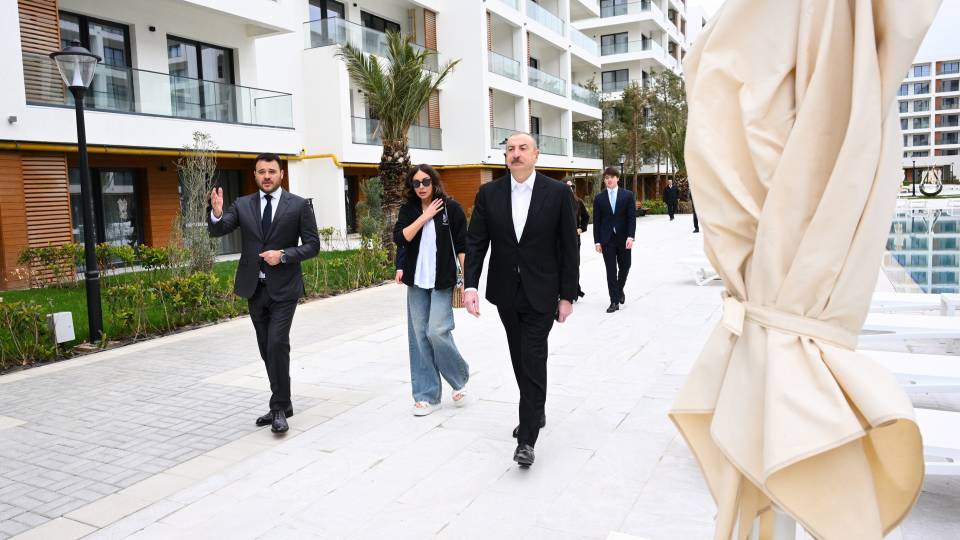
Dear Mr. Çavuşoğlu,
I was deeply saddened to learn of the passing of your father, Osman Çavuşoğlu — a profound loss for your family.
In this time of sorrow, I share in your grief and extend my deepest condolences to you and all the members of your family,...
18 April 2025, 12:37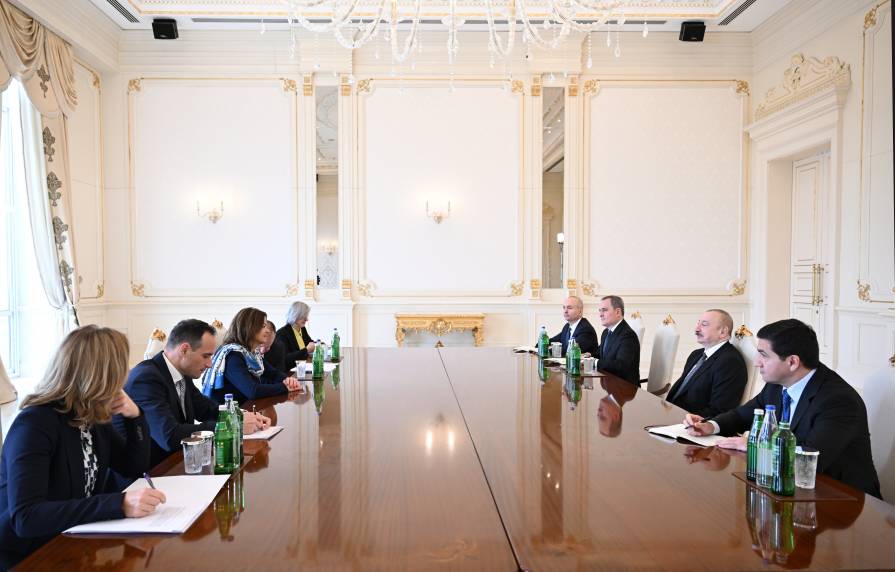
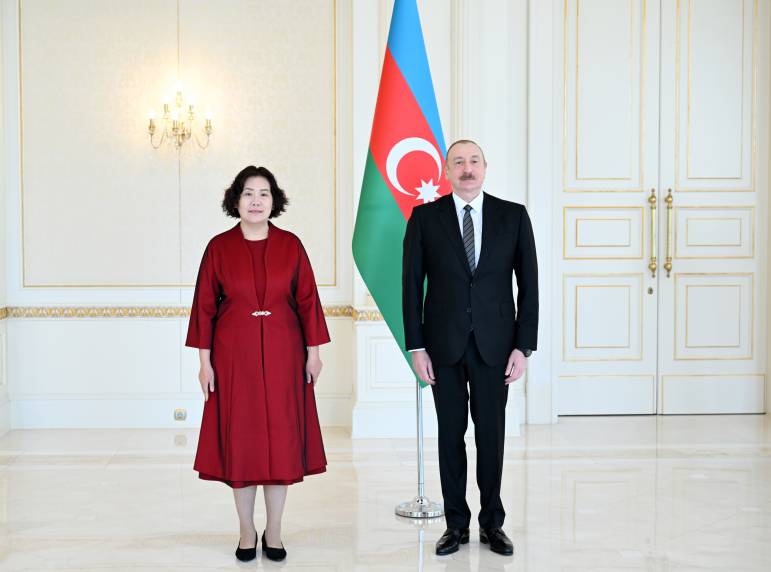
We were deeply saddened to learn of the passing of Richard Armitage – an eminent statesman, distinguished diplomat, dedicated public servant, and a great friend of Azerbaijan.
His years-long, productive service in international politics and diplomacy, coupled with...
16 April 2025, 18:06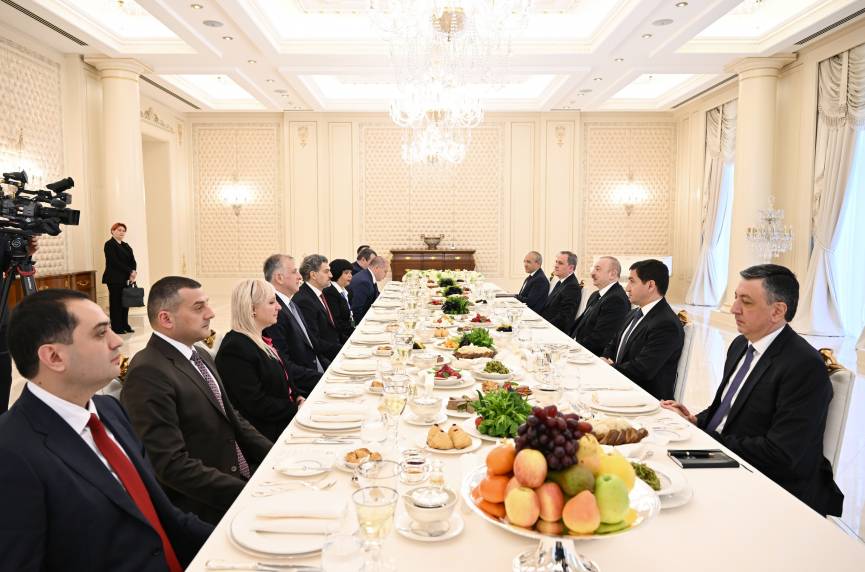
Statement by President Ilham Aliyev
- Dear Mr. President,
Dear guests,
Ladies and gentlemen,
Dear Mr. President, I would like to once again sincerely welcome you to Azerbaijan! I cordially congratulate you again on your election as a President and wish you ...
16 April 2025, 12:12